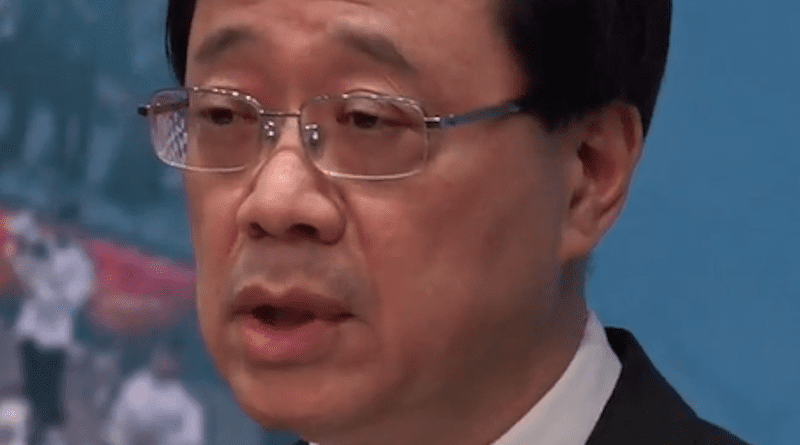Beijing’s Hand-Picked Leader In Hong Kong Has An Abusive Past – OpEd
By Maya Wang
After weeks of speculation, on April 8 the Chinese government unveiled its pick of Hong Kong’s next leader—John Lee, a former senior police official.
Hong Kong used to be the only territory under Chinese sovereignty with semi-democratic elections. Beijing has done away with them. Instead of a real contest to select its leader, Hong Kong people now witness a very expensive puppet show. The Hong Kong government has budgeted HK$228 million (US$29 million) for this one-man “election.” There are “election” posters; there is even an “election” “forum”—featuring only Lee— without a live audience. Appealing to no one but Beijing, Lee announced his policy platform only eight days before the May 8 “election.”
As Hong Kong’s secretary for security—and therefore one of Beijing’s right-hand men in Hong Kong–during the 2019 protests against an extradition bill, Lee showed blatant disregard for people’s safety. After the police assaulted peaceful protesters on June 12, Lee claimed, contrary to what millions of Hong Kong people saw on live TV, that the police had been “tolerant,” and that it was the protesters who had “violently” attacked the police to the point of “threatening…[their lives].”
Lee has repeatedly shielded the police from accountability. Regarding public calls for an independent investigation into police brutality, he maintained that the existing complaints mechanism – one that is part of the Police Force – is adequate. As to why the elite police unit whose members had administered the worst beatings to protesters seemed to have removed their badge numbers to evade identification, Lee claimed that there was, simply, “no space on their uniform.”
This performance has yielded him two promotions: first as the city’s chief secretary, and now, as the city’s chief executive. This is seemingly in tension with Hong Kong public opinion polls, which have consistently shown that over 80 percent of people support an independent commission of inquiry to look into police misconduct.
Beijing’s selection of an abusive former police official heightens concerns of an expansion of its repressive policies in the city. In China, police chiefs dominated local governance particularly under the leadership of Zhou Yongkang, the then Minister of Public Security from 2002 to 2007. During this period, local governments prioritized “stability maintenance” as a top goal. Many of the administrative and technological mechanisms for social control instituted at the time created the foundation for today’s suffocating Chinese security state.
Chillingly, Lee is well-known for having praised Beijing’s severe abuses in Xinjiang against the Uyghurs and other Turkic Muslims under the guise of countering terrorism—which Human Rights Watch found amounted to crimes against humanity. According to Lee, these abusive policies are “worthy of consideration” for Hong Kong as the city faces a “growing” threat of “domestic terrorism.” Lee also vowed to combat “fake news”—worrying rhetoric given the authorities’ deepening hostility toward media freedom in Hong Kong—and to impose a second security law on the city, Article 23, which would further criminalize peaceful activities such as contacting civil society organizations abroad.
Since Beijing imposed the first security law on Hong Kong–the National Security Law—in June 2020, it has aggressively dismantled the city’s freedoms. It has decapitated Hong Kong’s pro-democracy movement, arrested hundreds of protesters and others for exercising their freedom of speech, shut down outspoken media, civil society groups, and businesses, set up a hotline to encourage people to inform on each other, and otherwise create a climate of fear.
Things could have turned out very differently. In 2008, during Beijing’s Summer Olympics, Hong Kong people’s identification with China was at an all-time high since the territory’s sovereignty was handed over from the United Kingdom to China in 1997. The problem has been that Beijing kept breaking its promise to Hong Kong people: that Hong Kong people could choose their leaders, a promise enshrined in Hong Kong’s functional constitution, the Basic Law, and under the International Covenant on Civil and Political Rights.
In showing nothing but disdain for Hong Kong people’s rights, and in choosing a person with an abusive record to take the reins over a city already reeling with rights violations, Beijing continues to push many Hong Kong people—who once trusted it—into thinking that their future is incompatible with that of the Chinese government’s.
Maya Wang is a senior China researcher at Human Rights Watch.

